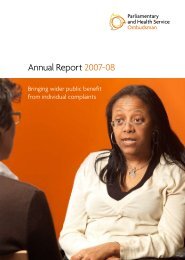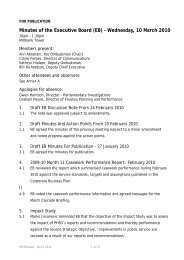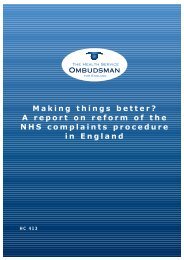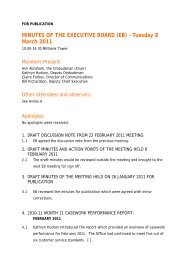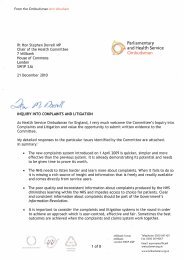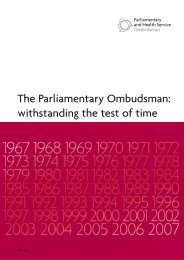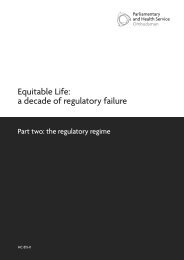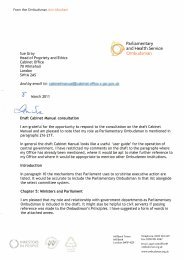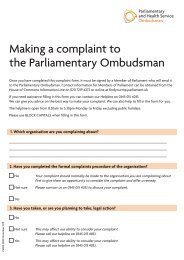Putting things right: complaints and learning from DWP - the ...
Putting things right: complaints and learning from DWP - the ...
Putting things right: complaints and learning from DWP - the ...
Create successful ePaper yourself
Turn your PDF publications into a flip-book with our unique Google optimized e-Paper software.
On 10 May 2007 <strong>the</strong> Agency sent a letter to Mr T<br />
requesting maintenance of £135 (<strong>the</strong>re was no<br />
indication for which period or for which parent<br />
with care this payment related to). Mr T made<br />
<strong>the</strong> payment on 11 May. On 29 May he emailed<br />
<strong>the</strong> Agency asking why <strong>the</strong>y had not replied to<br />
his correspondence or sent him a new payment<br />
schedule. Ms A telephoned <strong>the</strong> Agency on 9 June<br />
<strong>and</strong> was told that <strong>the</strong>y had not received any<br />
maintenance <strong>from</strong> Mr T. Mr T told us that Ms A<br />
accused him of failing to pay <strong>and</strong> reduced his<br />
contact with his daughter that week.<br />
Mr T telephoned <strong>the</strong> Agency four times on<br />
15 June 2007. In summary, he complained that <strong>the</strong><br />
Agency were dem<strong>and</strong>ing payment, not giving him<br />
a payment schedule <strong>and</strong> not returning his calls.<br />
His requests to speak to a supervisor during <strong>the</strong>se<br />
calls were refused. On 17 June Mr T sent an email<br />
of complaint to <strong>the</strong> Agency’s Senior Resolutions<br />
Manager. He said his calls had not been returned<br />
<strong>and</strong> that staff had been obstructive. On 25 July<br />
Mr T wrote a letter of complaint to <strong>the</strong> Agency. He<br />
said <strong>the</strong>y had not replied to his emails, <strong>and</strong> that <strong>the</strong><br />
£135 payment had all been paid to Ms A <strong>and</strong> had<br />
not been split with Ms B. On 27 July Mr T received<br />
a letter <strong>from</strong> <strong>the</strong> Agency requesting payments<br />
for 18 June <strong>and</strong> 19 July, which did not make clear<br />
which parent with care <strong>the</strong> payments related to.<br />
Mr T telephoned <strong>the</strong> Agency, <strong>and</strong> was told that<br />
<strong>the</strong> letter was wrong <strong>and</strong> a new payment schedule<br />
would be sent out.<br />
On 10 August 2007 Mr T sent ano<strong>the</strong>r email, fur<strong>the</strong>r<br />
to a telephone call <strong>from</strong> <strong>the</strong> Agency informing<br />
him that <strong>the</strong>y had sent his payroll details to an<br />
unknown party. He complained that <strong>the</strong> officer<br />
had refused to give fur<strong>the</strong>r details. He asked what<br />
information had been released, <strong>and</strong> whe<strong>the</strong>r <strong>the</strong><br />
Agency were trying to enforce a deduction <strong>from</strong><br />
earnings order on his employer. On 13 August <strong>the</strong><br />
Agency confirmed to Mr T that <strong>the</strong>y had been<br />
trying to place a deduction <strong>from</strong> earnings order,<br />
<strong>and</strong> were investigating <strong>the</strong> data protection breach.<br />
On 14 August <strong>the</strong> Agency sent Mr T a revised<br />
payment schedule. He owed arrears to Ms A,<br />
which he paid, but on 5 September <strong>the</strong> Agency<br />
telephoned him chasing <strong>the</strong> payment. (During<br />
<strong>the</strong> call <strong>the</strong> Agency realised that Mr T had paid<br />
<strong>the</strong> arrears but that <strong>the</strong>y had incorrectly split <strong>the</strong><br />
payment between Ms A <strong>and</strong> Ms B.) Mr T emailed<br />
<strong>the</strong> Senior Resolutions Manager to complain. On<br />
7 September <strong>the</strong> Agency told Mr T that as <strong>the</strong><br />
mistake was <strong>the</strong>irs, <strong>the</strong>y would pay <strong>the</strong> remaining<br />
arrears to Ms A.<br />
On 10 September 2007 <strong>the</strong> Agency told Mr T<br />
that an error by Royal Mail had led to <strong>the</strong><br />
disclosure of his personal details <strong>and</strong> that <strong>the</strong><br />
Information Commissioner had been informed. On<br />
21 November Mr T sent <strong>the</strong> Agency what was his<br />
eighth email of complaint, having been telephoned<br />
about a maintenance payment that he had in fact<br />
already paid. He also complained that he had not<br />
received any information about <strong>the</strong> investigation<br />
of <strong>the</strong> data protection breach. On 7 December <strong>the</strong><br />
Senior Resolutions Manager apologised to Mr T<br />
for <strong>the</strong> poor service he had received. He said <strong>the</strong><br />
Agency were investigating his <strong>complaints</strong> <strong>and</strong> <strong>the</strong><br />
allocation of his payments. On 12 December Mr T<br />
emailed <strong>the</strong> Senior Resolutions Manager to say<br />
he was unhappy with <strong>the</strong> letter of 10 September<br />
<strong>and</strong> to ask why <strong>the</strong> Agency had been pursuing a<br />
deduction <strong>from</strong> earnings order.<br />
What we investigated<br />
Mr T complained to <strong>the</strong> Ombudsman in July 2007.<br />
We investigated his <strong>complaints</strong> that:<br />
• <strong>the</strong> Agency had tried to enforce a deduction<br />
<strong>from</strong> earnings order when <strong>the</strong>re were no arrears;<br />
80 <strong>Putting</strong> <strong>things</strong> <strong>right</strong>: <strong>complaints</strong> <strong>and</strong> <strong>learning</strong> <strong>from</strong> <strong>DWP</strong> | March 2009





